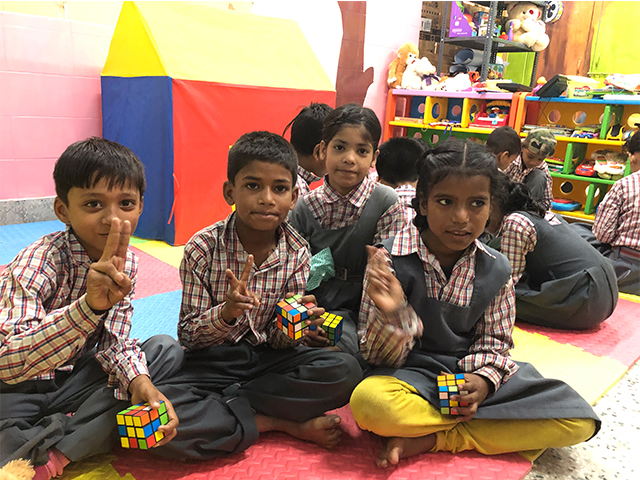
“I am always keen to solve Rubik’s cube but, I hardly get to play with it. Although I cannot solve it fully, I am still amazed that I could solve it partially.” – Roji, an 11-year student from grade fourth.
The Rubik cube is a simple puzzle to sharpen your brain. It improves your hand-eye coordination and concentration. Rubik is an open-ended puzzle that needs no instructions and enhances the problem-solving abilities of the child as they attempt multiple numbers of times to solve it.
About 90% of the children studying in government schools crave to learn new ideas and concepts. But, the old-fashioned rote learning in the schools constricts their opportunities to learn and reflect critically or creatively. The safe playroom is a step towards building curiosity and learning new concepts where a variety of toys, board games and storybooks are utilized. Roji, who was never happy to visit the school is now always excited to visit and learn by play-way-method.
The Playroom is a step towards enhancing the skills of the children through play. Through these safe playrooms, we aim to provide enough space for students like Roji to develop social, cognitive, physical and emotional skills that form the foundation needed to have a healthy future.
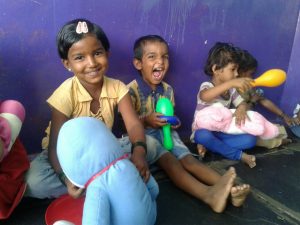
Making School a Home away from Home
Opening days in pre-school are stressful for every child. The separation from mother or caregiver increases the level of anxiety among the children. Some youngsters can cope-up with anxiety and adapt to their new surroundings. But there are always a few children who are not able to adjust with the new surroundings and often get frightened.
A similar situation was witnessed with a four-year-old boy name Asif in South Delhi Municipal Corporation School, Malviya Nagar. He was unable to cope up with the separation anxiety and used to start screaming, crying and banging his head at the door and continuously asking for his mother to come back. His anxiety made him stressed out and he faced difficulty falling asleep and eventually missing the school due to weakness.
The Toy Bank coordinator was observing his behaviour regularly and invited him to the playroom. When he visited the playroom for the very first time, he was all happy and smiling. He couldn’t believe what he was missing when he saw a room full of toys he could play with, he was extremely joyous. The coordinator invited the whole class so that he doesn’t feel shy and enjoys his time. He didn’t pick any toys but looked around the toys and games to play and which toy his classmates are picking for play. He calmly sat with one group playing with the train set. He gradually started enjoying the company of his classmates and eventually made friends. The separation anxiety was still present but started diminishing with the time as he began sitting in his class and listening to his teachers with one promise: To get a chance to visit playroom every day and play with toys he wants to.
A school is a place in which you explore what motivates you and what makes you curious and what makes you genuinely want to learn. It’s a place where the children learn social-emotional skills by observing and responding to the social behaviours of the others. It should not be just about preparing the children for secondary school. However, to make a child emotionally healthy and strong play is the best medicine. And, we at The Toy Bank focus on providing holistic childhood development through play. Since during these years, a child develops social, cognitive, physical and emotional skills that forms the foundation needed to have a healthy future.
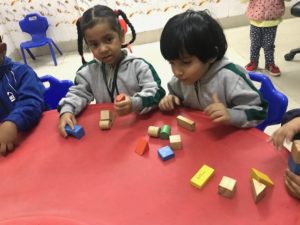
“From the anxious girl who use to sit in a corner. Nancy now has started to ask for puzzles with higher difficult level. She now helps her classmate when they are stuck while solving them”
Engaging young children in right direction is complex. It becomes very difficult to engage a child who doesn’t like to speak much in the classroom and tries to make their classmates as a shield from which they cannot be seen. Here, play comes as a key or tool to break the unseen shield filled with shyness, doubts and insecurities.
A similar situation was recognised with a six-year-old girl name Nancy (name changed) in South Delhi Municipal School, Kailash Colony. During her initial days, she always sat silently in the playroom when her classmates were playing with different variety of toys and board games. She was always having anxiety and looked worrisome. Moreover, she preferred to sit at the corner of the playroom, believing that nobody could see her and desperately waited for the school bell to ring. After communicating the same concerns with her class teacher, it was observed that she acted similarly in regular classrooms.
During her interaction with the Playroom-in charge she responded saying that she doesn’t like to play and likes to sit alone with head down. The in-charge decided to engage her by putting random toys and board games in front of her, hoping that she might start playing and develop interest. But after receiving no response from her, the in-charge decided to play with her with different toys. One day, the in-charge started solving a puzzle game and pretended that she was unable to solve it. Nancy responded by assembling the missing pieces. She made a huge start by simply assembling the missing pieces of puzzle.
Gradually, she began accepting different puzzles offered by the Playroom in-charge and solving it, she also started enjoying solving the puzzles. Her determination to solve the puzzle game was growing. She started asking for more puzzles where the level of difficulty increased. Now, she has also started to help her classmates when they are stuck while solving the puzzles and is very active and the first one to select a game for playing. And now, if we ask her, “Do you like to Play Nancy?” Her answer is “Yes, I like to play with puzzles and railway track board games”. She also confided in the Playroom in-charge, that she was scared to enter the Safe Playroom as she thought that the room full of toys, must be expensive and if she breaks a toy then she has to pay money.
Play is an integral part of a healthy childhood. To keep children physically and mentally healthy, we should always engage them in the structured and unstructured play experience. Engaging and healthy play activities enhance the mental health of children and well-being. And, Safe Playrooms aims to provide a safe and healthy environment for children who belong to economically weaker section. For them, toys and board games is a luxury which they cannot afford. The Toy Bank strives to bridge this gap by increasing the access to toys and storybooks to the children who do have any access for both leisure and education.
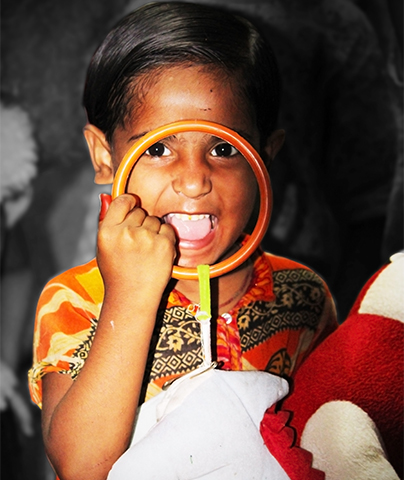
“I have been playing with the board games because these toys have made me feel that I am not the deprived one. If, I can have toys which the rich city children can have then I can also do what they achieve in life. I am not born to be trafficked or be a daily wage labourer” – 12 year old girl, Jaunha Village, Jharkhand
Opening days in pre-school are stressful for every child. The separation from mother or caregiver increases the level of anxiety among the children. Some youngsters can cope-up with anxiety and adapt to their new surroundings. But there are always a few children who are not able to adjust with the new surroundings and often get frightened.
Children living in tribal areas barely get an opportunity to play with toys. And, to address the need, The Toy Bank has created Educative Toy Libraries for 200 children studying in the tribal schools of Jharkhand. It was created for children between the age group of 5 – 18 years.
The library created in the tribal areas was a big success. Access to toys and storybooks motivated the tribal children to stay longer in the school. They are always excited to come and play with different toys every day. There has been an increase in the attendance of the children by 75 per cent.
The story of this 12 year old girl with big dreams is in itself an inspiration to us. The simple act of donating a toy and sending it to a place which do not have any access to toys and storybooks allows us to bridge the gap and imbibe the values of sharing and caring among the children.
The library caters the tribal children for both educational and leisure activity. And, It’s quite mesmerizing to see that children are always geared up to play with different toys like puzzles, blocks, building block and board games which will keep them engaged and improve their physical and mental skills. The teachers could see an improvement in the learning skills of children after receiving the toys. They believe that the children learn more effectively when they are taught by play way method. The fun and engaging activities brought a lot of positive impact on the tribal children.
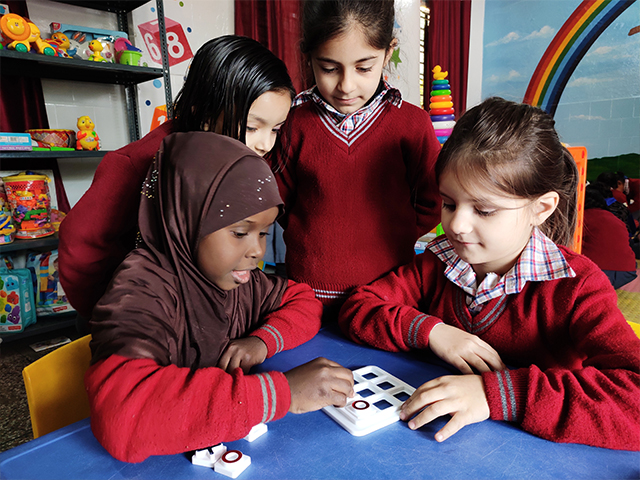
From Leisure to Educational Play
Playtime is a very significant aspect of early childhood. It promotes social, emotional and cognitive development in children. There is a common belief that play is a leisure activity in which a child doesn’t learn anything. Whereas, we believe that play includes building an imaginary situation, pulling out different roles or characters or, playing a game with rules through which, they learn essential skills such as problem-solving, teamwork, co-operation, creativity, language skills and much more. And, to enhance these skills they need a range of play material.
We, under Safe Playroom project, provide more than hundred varieties of toys and board games to the students enrolled in the Municipal School of Delhi. The children enrolled in these schools are from the economically weaker section and have limited number of toys or any other educational aids. We have implemented Safe Playroom project in Municipal School of Delhi situated in Kailash Colony and Malviya Nagar.
The first academic year with Safe Playroom in Municipal Schools of Delhi is coming to an end. And, we are quite impressed to observe the slow and steady change in the attitude of the students visiting the Safe Playroom. We still remember the first day of the playroom when the students were unable to contain their happiness after seeing a room full of toys where they get an opportunity to play with kitchen sets, dollhouse, and cars with their classmates in the school. Earlier, they were only limited to the pretend-play and, very few of them wanted to do participate in activities like solving puzzles or, playing brainstorming board games.
Slowly but surely the students visiting the Safe Playrooms have started exploring the different play materials as they have outgrown from playing with a kitchen set, car, dollhouse in pretend play which emerges from their real life experiences. For example, a girl child playing with the doll set repeats almost exactly, what the mother enacts with her baby. However, the situation has now changed and, students want to put their hands-on board games and constructional play. The students of both the schools have started indulging themselves in those games which will enhance their creativity, critical thinking, language, numeracy, leadership, teamwork and social skills. Solving puzzles, creating objects from building block and Lego, playing board games like chess and monopoly is what they like to do during their free play in the Safe Playroom.
Kanchan, a girl from fifth grade, never believed that playing chess could be so much fun. Once she learnt all the rules and moves of the game.
Similarly, students from first grade love to solve tic-tac-toe and, different puzzle games of flowers, fruits, opposite words and their favourite cartoon characters. Earlier, they all used to fight with each other for either doll sets or kitchen set. But now the situation has changed drastically, as they have learnt how to control their emotions while playing with others.
Now, the students are more interested in participatory learning, for example, building a zoo with building blocks and animal set, singing and playing with musical instruments, solving puzzles and many more. Further the play sessions encourage them to learn new words, animal name, colour name, solving sums and nurture good habits. The Toy Bank encourages the children to come out, play and ensures that every child has access to the toys, board games and storybooks for both leisure and educational, thereby making sure that the child’s Right to Play is implemented.

